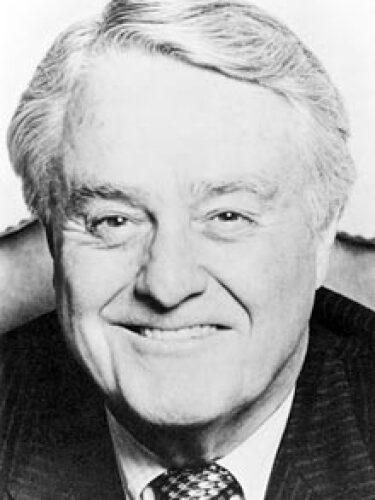Sargent Shriver
1915-2011
In a career of public service and civic leadership spanning the second half of the 20th century, Robert Sargent Shriver, Jr. (“Sarge”) confronted a range of seemingly intractable conflicts that at times pitted Americans against each other, and at others the United States against other nations. He worked to build peace by developing and implementing programs and policies structured to promote long-term, cumulative, peaceable change.
The key to Shriver’s legacy of success as a peacebuilder lies in his ability to create feasible, effective programs that promote human dignity, welfare, and justice. All the programs he created are informed by a method in peacebuilding he once described as “a formula for practical idealism.”
Shriver was born November 9, 1915 in Westminster, Maryland. He attended Yale University in the 1930s, where he was the senior editor of the Yale Daily News. Shriver enrolled in Yale Law School in 1938, receiving his L.L.B. in 1941. He then went on to serve five years in active duty in the U.S. Navy during World War II.
In 1953, Shriver married Eunice Kennedy, sister of John F. Kennedy. During their years in Chicago in the late 1950s, he served as the head of the Chicago School Board and the Catholic Interracial Council. In these roles, he addressed America’s racial conflicts by leading successful efforts to integrate Chicago’s public and parochial school systems.
During the Kennedy Administration, Sargent Shriver created the Peace Corps, serving as its first Director. This bold and enduring international program builds peace and fosters diplomacy by sending Americans to work on local projects in communities throughout the developing world.
As Director of the Office of Economic Opportunity in the Johnson Administration in the mid-1960s, Shriver developed a multi-faceted War on Poverty designed to transform the economic and social roots of the conflict over civil rights in America. Like the Peace Corps, the programs of the War on Poverty - including Head Start, Job Corps, VISTA, Community Action Program, Legal Services to the Poor, and Foster Grandparents - continue to serve Americans today.
Between 1968 and 1970, Shriver served as U.S. ambassador to France. Then, in 1972, he was nominated by the Democratic Party as a candidate for Vice President with presidential candidate Senator George McGovern. In 1976, he was also a candidate for President during the Democratic Primaries.
In the 1970s and 1980s, Shriver addressed the inter-religious tensions at the heart of the conflict in the Middle East by convening, for over five years, the first official Trialogue of the Abrahamic faiths since the Moors ruled medieval Spain. He also addressed domestic and global tensions over America’s escalating nuclear arms race with the Soviet Union by securing affirmation of a No First Strike policy by senior U.S. foreign policy officials and the U.S. Conference of Catholic Bishops.
Shriver went on to become President of Special Olympics in 1984. He was appointed Chairman of the Board of Special Olympics in 1990. Under his leadership, Special Olympics greatly expanded its international sports programs for young people around the world.
On August 8, 1994, Sargent Shriver received the Presidential Medal of Freedom from President Bill Clinton, the United States’ highest civilian honor, as recognition for his lifetime of public service.
Shriver remained active well into the 21st century, speaking regularly at graduation ceremonies and other high-profile events. He passed away on January 18, 2011. He is survived by his five children: Robert Sargent Shriver III (Bobby); Maria Owings Shriver; Timothy Perry Shriver; Mark Kennedy Shriver; and Anthony Paul Kennedy Shriver.
During his life, Shriver received numerous awards, including:
- Veteran of the Year, 1956;
- James J. Hooey Award, Catholic Conference for Interracial Justice Council of New York, 1958;
- Lay Churchman of the Year, 1963;
- National Father of the Year, 1964;
- Notre Dame Patriotism Award, 1965;
- National Brotherhood Award, 1966;
- Hannah G. Solomon Award, National Council of Jewish Women, 1972;
- the Order of the Smile, 1989;
- Franklin D. Roosevelt Freedom From Want Award, 1993;
- Presidential Medal of Freedom, the United States’ highest civilian honor, 1994; and
- the “Distinguished American Award” from the John F. Kennedy Library and Foundation for his inspiring work with the Peace Corps; Shriver Head Start Center in Salt Lake City, Utah, USA, 2001.
Shriver also received more than 24 honorary degrees from universities around the world, including Yale University, Brandeis University, Boston College, Yeshiva University, the University of Liberia and Chulalongkorn University in Bangkok, Thailand.


